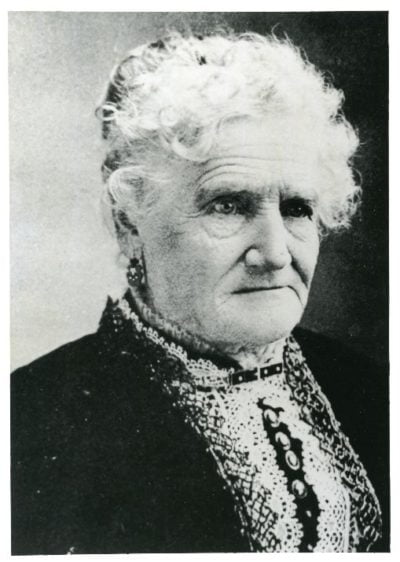March 8, 2021
By Kathryn Montana Perkinson
Wind River Country’s population might be small, but the individuals are mighty. March is Women’s History Month and we want to celebrate the life of one of Wind River Country’s greatest heroes: Esther Hobart Morris.

Morris stands out as a leader in women’s suffrage. She was born in Tioga County, New York in 1812. At the age of 30, Morris moved with her son to Illinois after her first husband passed away. In 1850 she married local merchant John Morris and gave birth to twins. Eighteen years later, her husband and firstborn moved to our own South Pass City in what is now Wind River Country.
The following year, Morris and her twins joined their family in the rugged gold rush town. Over the course of days, they made their way by train to a point 25 miles east of Rock Springs, Wyoming and traveled the rest of the journey by stagecoach. The expansive sagebrush high desert was unlike anything Morris had ever seen. It was so dry, so open, and so stunning.
She moved into her humble log cabin with a sod roof right on the Continental Divide. Unfortunately after not too long, there was a “bust” and the nearly 4,000 residents of South Pass City fled.
But the Morris family remained. In the small town, there were four times as many men as women. In 1870, Morris succumbed to pressure from District Court Judge John W. Kingman and submitted an application for justice of the peace. And on Valentines Day, 1870, she became the first female justice of the peace in the nation. The year prior, Wyoming became the first state to allow women to vote. This made it possible for Morris to fulfill her new role.
The telegraphed press release from the county clerk read:
“Wyoming, the youngest and one of the richest Territories in the United States, gave equal rights to women in action as well as words.”
Unfortunately and not surprisingly, her appointment was not met with enthusiasm from most of her town. Judges resigned, lawyers tried to trick her with technicalities, and even her own husband made a scene of disapproval in her own court. Eight months later she sought re-election but was denied nomination by either the Democratic or Republican party.
Her brief tenure was still powerful and symbolic. She continued work in women’s rights after. In the years to come, she attended numerous suffrage conventions throughout the United States and received a few honors. Thank you, Esther Hobart Morris, for helping bring equality to Wind River Country and the US as a whole!
KATHRYN MONTANA PERKINSON is a writer living in Lander, Wyoming. Find more at kathrynmontana.com and @kathrynmontana.
Posted in Notes From the Field